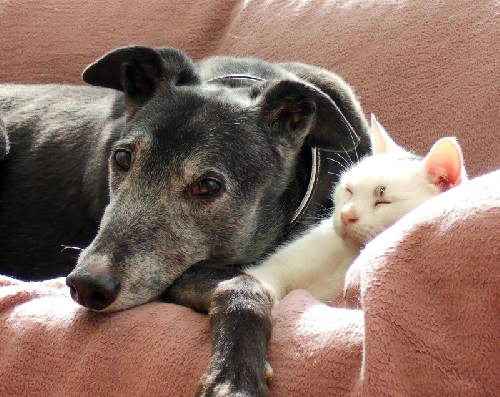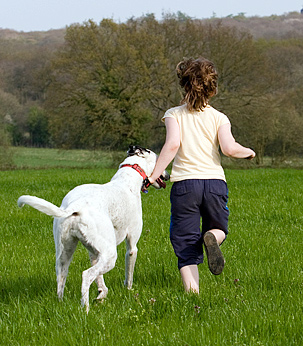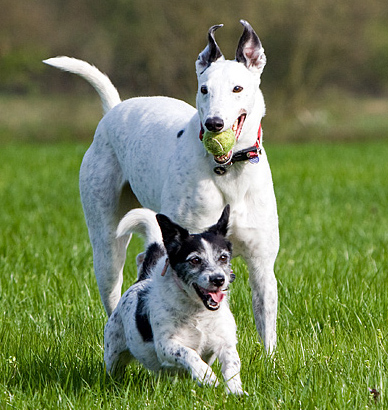The Greyhound is a lovely breed of dog and contrary to popular belief, Greyhounds make fantastic pets.
There are quite a few myths around owning one of these animals that need dispelling. Firstly, it is widely believed that they need copious amounts of exercise when in fact two 20 minute walks a day are usually sufficient. However, longer walks on a number of occasions during the week would be in their best interest.
Another widely held myth is that they can't co-habit with smaller furries e.g. cats etc. This is not always the case – many hounds can be the best of friends with their fellow small furries!
However, there are certain aspects of owning both greyhounds and small furries that need to be taken into account. By approaching a breed specific rescue the rehoming officers will be better able to advise you on whether they have dogs available for rehoming that have been proven to be good with small animals. They will also give you advice on how to make sure the introduction goes as smoothly as possible.
 Greyhounds are good pets to have around children since they are generally of a gentle and placid nature. However, as with all breeds common sense and adult supervision is the order of the day.
Greyhounds are good pets to have around children since they are generally of a gentle and placid nature. However, as with all breeds common sense and adult supervision is the order of the day.
There are certain breed requirements that differ when you own a greyhound with anaesthesia being one of them. It is imperative to check that your vet is sight hound aware before allowing him to treat your dog.
Greyhounds can also be prone to a condition called gastric torsion (bloat) which is a serious condition requiring immediate veterinary attention. Ways to avoid this include raised feeding and giving the dog no exercise directly before or after meals.
Greyhounds do not need a special diet specific to the breed. They enjoy a mixed and varied diet and can thrive on complete dry foods which are readily available at retail outlets; and if you're happy to add ingredients like sardines, mince, vegetables etc then your Greyhound will be more than happy too!
 As with any dog, it is important to keep your Greyhound's vaccinations up to date. Most rescues will have dealt with this prior to adoption but yearly boosters are required. It is also recommended that parasites are kept under control by worming on average about every 4 months and maintaining a regular program of de-fleaing. These preparations are reasonably cheap and available from your vet.
As with any dog, it is important to keep your Greyhound's vaccinations up to date. Most rescues will have dealt with this prior to adoption but yearly boosters are required. It is also recommended that parasites are kept under control by worming on average about every 4 months and maintaining a regular program of de-fleaing. These preparations are reasonably cheap and available from your vet.
Dogs with a racing background and indeed some from a home environment may have poor teeth. Again most organisations will have dealt with this prior to adoption. It is advisable to get a dental paste from your vet - these are generally inexpensive and can help reduce the build up of tartar.
A rescue greyhound is worth taking a chance on. With patience and love they will repay your kindness tenfold. These dogs show a bond and devotion to their owners that can only be described as second to none.



